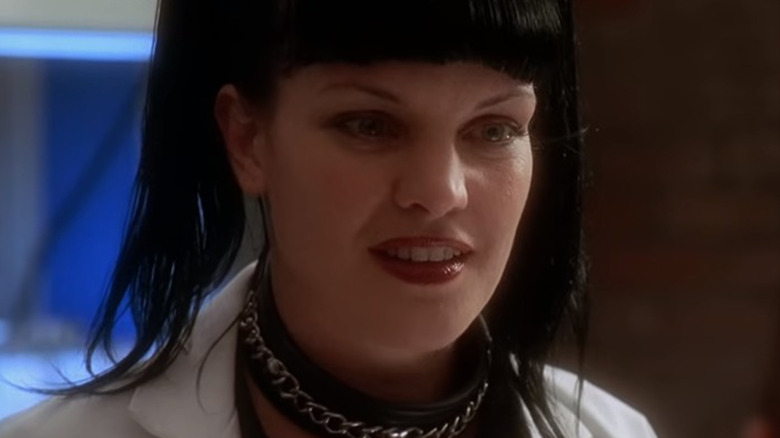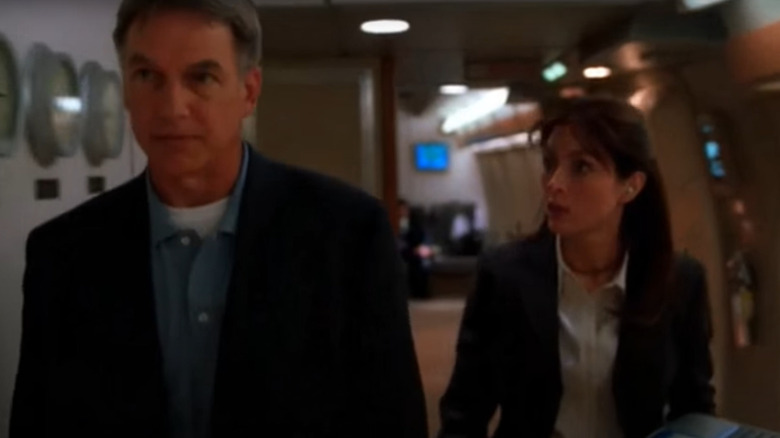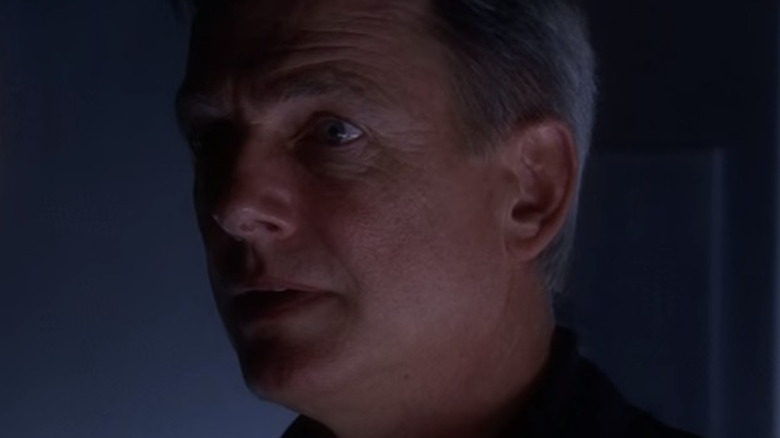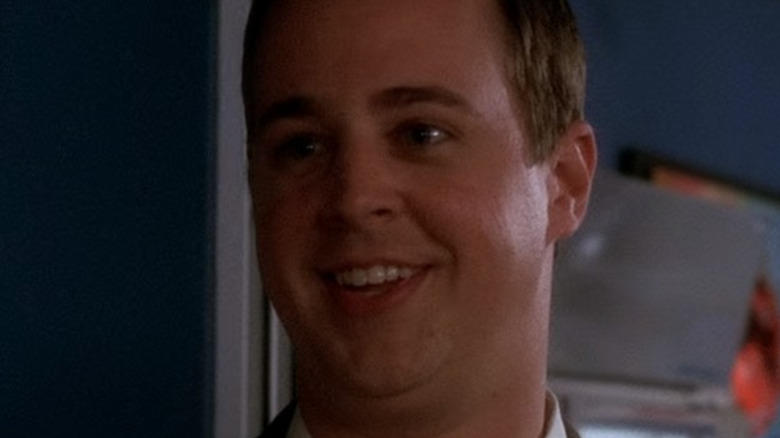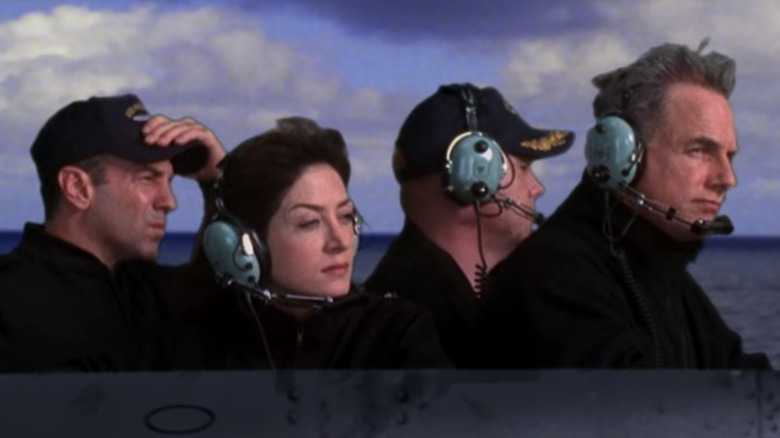Questionable Things We Ignore In NCIS
CBS's "NCIS" is a gold-star fan-favorite within the procedural crime TV genre. Agent Leroy Jethro Gibbs (Mark Harmon), sometimes known as Jethro to his closest colleagues, leads a team of talented agents to solve the hardest cases to hit the U.S. Navy and U.S. Marines. "NCIS" is one of the better procedural crime dramas, and not just because of Gibbs' heart of gold or because Abby Sciuto (Pauley Perrette) is so loveable, but because the show offers fans a layer of authenticity and a glimpse into the lives of service members rarely accessible to the civilian eye. Each episode follows the team as they go about solving crimes, taking down terrorists, and capturing rampant serial killers.
"NCIS" is CBS's most watched broadcast series and has been hailed as a TV "juggernaut." But even a juggernaut, unstoppable though it may be, has flaws. Whether it's the departures from real-life plausibility that are caught by fact-checking fans or the multiple blatant workplace violations, there are a lot of missteps throughout the show's run, which started all the way back in 2003. Here are some questionable things in "NCIS."
Agent Gibbs smacks his employees
Have the writers of "NCIS" ever heard of this wild new concept called a "lawsuit?" Gibbs has a gargantuan superiority complex, and while that may be fine to a degree, we draw the line at smacking your employees upside the head when they make mistakes.
The show and its characters make it out to be like casual physical abuse is Gibbs' way of showing paternal guidance — with a quick move that says, "Nope, try again." When a member of his team makes even a small mistake, instead of saying, "Hey, maybe try this other method of problem solving or critical thinking because that clearly isn't working," he goes straight for smacking. In one instance, he delays a slap to Agent Tony DiNozzo (Michael Weatherly) after DiNozzo makes a joke and says, "It's no fun if you know it's coming." DiNozzo responds by turning around and slapping Agent Tim McGee (Sean Murray).
In any normal workplace context, that's clear-cut grounds for instant dismissal. It wouldn't matter if you were a lowly agent or running the whole show. Workplace assault is not all that and a bag of chips. Gibbs, as a senior special agent capable of running his own team of individuals, should know that.
Abby and Ducky's jobs are heavily exaggerated
Procedural crime dramas have a way of manipulating the reality-based aspects of their characters' jobs. In order to fast track some of the scenes that would normally involve a lab filled with a team of scientists, it sort of makes sense for a TV show to speed up the forensic process.
In the case of "NCIS," Abby and Ducky's (David McCallum) jobs wouldn't exist in real life. We don't mean that forensic analysts and medical examiners aren't actual jobs — obviously, they are. However, a forensic analyst and medical examiner wouldn't work within an NCIS building; they wouldn't have a direct line of communication to an NCIS agent, nor would only there only be one of each. A real-life NCIS field office would work with local state or county medical examiners and labs for forensic evidence and each one would certainly have more than one person working there (via Crime Museum). Gibbs' team also isn't the only group of field agents that operates in that branch of NCIS. In that case, Abby and Ducky would have to keep up with Gibbs' cases and every other agent's cases. If that were true for real-world counterparts, the overtime costs alone would be astronomical.
For the sake of television, it's pretty much a necessity to keep the show's pacing punchy and exciting. Otherwise, each episode would be a victim of the red-taped, glacial pace of real-time forensic sciences.
The team steals Air Force One in the first episode
In the very first episode of "NCIS," titled "Yankee White," the death of a Marine on Air Force One triggers a mess of jurisdictional complications. The ultimate question of this episode is who claims jurisdiction over the death of a Naval commander who dies on Air Force One? Do Gibbs and his team have any right to fly away with the president's plane in order to hold such jurisdiction?
Ok — let's break this one down. It's weird. The second the president walks off the plane, the Secret Service loses jurisdiction, and it gets handed off to FBI, hence FBI Agent Fornell's (Joe Spano) presence at the crime scene. But in accordance with SECNAV Instruction (via Department of the Navy), since NCIS has a horse in this race in the form of a dead officer, "joint criminal investigations [...] conducted with the FBI [...] designate NCIS as having exclusive responsibility." So, in the real world, NCIS actually would have jurisdiction to take custody of the body. But does that really give them the right to snatch the president's plane to ensure they keep custody? And if they can't take the plane, how is it that we never hear about anyone getting in trouble for that stunt?
Agent Gibbs' rules are weird and random
One of Gibbs' quirks is his lengthy list of personal and professional rules (via TV Insider).
Some of them make sense in the professional setting of "NCIS." For instance: Rule number two, "Always wear gloves at a crime scene," and rule number 10, "Never get personally involved in a case." Some of the other rules, however, are weird rules to impose on subordinates. Rule nine says, "Never go anywhere without a knife." Another one, rule eight, says, "Never take anything for granted." Sure, that's a good life lesson to teach your kids, but how does that help Gibbs' team take down the bad guys?
Some rules are slightly weird, while others are downright unnecessary. For example, rule 22 says, "Never mess with a Marine's coffee if you want to live." Perhaps a more appropriate and professional version of that sentiment might be, "Please don't mess with the things I consume. That kind of bothers me. Thanks." Gibbs' rules even go so far as proving to viewers that he's at least a bit paranoid; specifically, there's rule 36 — "If it feels like you're being played, you probably are." Then there's Rule 40, "If it seems like someone's out to get you, they are." Neither of these informal laws of conduct provide much support in work or personal life.
Ducky commits some serious forensic no-no's
When it comes to forensics, contaminations are one of the worst mess-ups that can happen to an investigation. It's also the case that biohazardous materials, which can possibly cause illness and contamination, are frequent fliers in a medical examiner's field. Ducky, who is supposed to be the best at what he does, ought to know how not to contaminate a forensic lab or spread unsanitary materials.
In "Sub Rosa," Ducky potentially contaminates several areas with biohazardous materials. He meets Abby in her lab after performing an autopsy. As he enters Abby's area, we can see he is still in his surgical gown and there's blood smeared all over the front. Blood is considered a biohazard material (via UCSD) and not only does bringing it out of his lab and into Abby's increase the chances for an infection to break loose, but it could potentially contaminate any other evidence that is present in Abby's workspace. Gross.
In other episodes, Ducky, among other investigators, commits potential crime scene contamination through lack of proper personal protection equipment. The National Institute of Justice explains that crime scene investigators must have items such as "gloves, booties, hair covering, overalls, and mask," readily available for a crime scene sweep. Get it together, Ducky.
The team is inexplicably the only force against that one terrorist
The team encounters their very first multi-episode "NCIS" villain near the end of Season 1. By the "NCIS" Season 2 finale, he's still at large.
But we're more curious about why a standard criminal investigative team would seemingly be the sole faction charged with taking down terrorist Ari Haswari (Rudolf Martin). Gibbs and his agents typically take on cases that involve far more standard crimes than counterterrorism. In fact, real-life NCIS does include counterterrorism efforts, but that wouldn't include a team like Gibbs'. The "NCIS" group would probably have to undergo a lot of extra training dedicated to counterterrorism that would hardly ever come up in their day-to-day work. Even after all that, where exactly is the time to get all their other case work done if they're going after terrorists?
The real-life counterterrorism portions of NCIS would take on a case like Ari's, and it would probably take years of dedicated work and a lot of information sharing with other federal branches (via NCIS). It's a safe story arc, especially for the era in which it was originally aired. In the years following 9/11, counterterrorism and heavily inflated patriotism flooded the United States, making this a TV plotline that went over well with American audiences.
The team plays fast and loose with the rules
Bending the rules is one thing, but the way the "NCIS" team actually breaks some laws is on a whole other level.
In one instance, DiNozzo needs access to someone's home to search for evidence. In any normal circumstance, he'd have to obtain a warrant to get into the house. But to fast track the situation, he creates exigent circumstances to enter the house by hurling a rock through the window. In his mind — and in the show's mind, apparently — this gives him justification to enter the house. Someone has apparently broken in, which means law enforcement officer DiNozzo should probably go check that out. You know ... for evidence.
McGee is the good boy of the group. He can be counted on to always follow the rules and solve the case within the confines of the law. But in "Twisted Sister," his sister shows up at his door panicking and covered in blood, and the rules fly out the window. McGee uses NCIS resources on the down-low to figure out what happened, and he lies to his superiors in an attempt to protect his sister. When Gibbs finds out McGee is withholding some serious evidence and a prime suspect, he's really mad. In any normal criminal investigative job, McGee would probably be fired and possibly even prosecuted. It's one of McGee's worst moments on "NCIS" without question.
The team treats newbies pretty badly
Next to allowing their employees to thwack each other around the office, the authority figures of "NCIS" apparently have no issue with hazing, either. Since McGee is what the team refers to as a "probie," he's often the one on the receiving end of DiNozzo's cruelty. Sometimes DiNozzo's wrath is minimized to mild pranking, teasing, or passing of his cases' scut work; sometimes, it ranges to DiNozzo just plain harassing McGee.
In "Forced Entry," we see some of the milder forms of abuse McGee deals with. DiNozzo hands McGee Gibbs' coffee and tell McGee he got it just for him. If you remember Gibbs' rules, you know not to mess with a Marine's coffee if you want to remain among the living. But McGee drinks it and spends the first portion of the episode frantically apologizing to Gibbs. Not seconds after, McGee falls victim to another one of DiNozzo's so-called pranks when McGee tells Kate that DiNozzo invited him to a fundraising party — one whose guest list is filled with "Playboy centerfolds." In reality, DiNozzo is dragging McGee to sling soup at a homeless shelter and Kate lets him think he's walking into a 15-year-old boy's dream party.
DiNozzo makes fun of Agent David's English
Ziva David (Cote de Pablo) is one of the more capable agents in "NCIS." She is a highly skilled Mossad officer who joins "NCIS" after Kate's murder.
Of her many talents as an NCIS field agent, Ziva explains in "Switch" that she knows at least five languages. Clearly, she's fluent in English. An r/NCIS subreddit suggests she can actually speak up to 10 languages and we see her use a few throughout several "NCIS" episodes. Keeping up with that many languages is practically an Olympic sport, and if Ziva has significant conversational abilities in most of them, if not all 10, that's pretty darn impressive.
So why the heck is DiNozzo always correcting her? Perhaps if she was just learning to speak English, it may be a nicety on DiNozzo's part to correct her most obvious mistakes, but she mostly only trips up on English idioms. Idioms are sometimes even difficult for native speakers to get right, so it's not very nice of DiNozzo to correct her every chance he gets. According to a CBS trivia quiz, DiNozzo only speaks English and Spanish, so maybe he shouldn't be getting all over Ziva for her English idioms because she'd laugh him right out of eight other styles of conversation.
There are a lot of sexist overtones
"NCIS" spent some time in hot water when fans and critics started asking, "Is NCIS sexist?" A lot of concerns over the show's depiction of women came about because of Michael Weatherly's character, DiNozzo.
During the first few seasons, DiNozzo and Kate are constantly bickering about the differences between men and women all while plopping women into two-dimensional stereotypical roles and behaviors. It's honestly more than a little tacky and cringy. In later seasons, there's a pretty big shift in DiNozzo and the overall tone of the show, as audiences grew tired of watching the same prejudiced banter (via Express UK).
Fans noticed a shift in "NCIS" personalities around Season 9. But instead of it being a step away from their initial portrayal in earlier seasons – which would probably mean multiple personality rewrites — the shift was designed to allow the show's women more depth, as opposed to the shallowness we'd previously seen.
Agent Todd experiences the Navy's discrimination against women on submarines (almost)
The U.S. military has a reputation for being a boys' club. Women were long excluded from military service in some form or another. In "Sub Rosa," we see a pretty modern example of that exclusion.
As the episode goes, Gibbs and one of his agents must board a nuclear submarine to solve one of their cases. While Gibbs and Kate are talking to the captain of the boat, he speaks pretty blatantly about the "inconveniences" of a woman boarding. Until 2010, the U.S. Navy banned women from serving on submarines altogether; a woman working on a sub was still considered new and scary to some of the Navy's old timers. Gibbs' somehow convinces the captain that Kate is a better person for this job than DiNozzo. Maybe this was the show's way of proving Gibbs was some kind of chivalrous champion for women.
In real life, Kate would've encountered some inconveniences of her own. There were no accommodations for women on submarines at all before the ban was lifted, so sleeping and going to the bathroom on the sub would have been a whole issue for Kate. After 2010, the Navy had to retrofit subs with a surprising number of modifications to include women (via U.S. Veterans Magazine).
DiNozzo is a harassment lawsuit waiting to happen
Apparently, rules are loose guidelines when it comes to the "NCIS" workplace. Even someone like DiNozzo should know when to pump the breaks and start thinking with his head instead of his other appendages.
DiNozzo has nearly no filter when it comes to talking to women, whether it be at work or when he's off the clock. But since what he does in his own time is up to him, we're more concerned when he's trying to pick up women while working cases. In "Forced Entry," he and Kate are sent to question a suspect at a base hospital. When he approaches the desk to ask the Lieutenant on duty about the suspect, he asks her out to a lunch date so he can go through some routine questions. Uh-huh, sure, DiNozzo. She flashes him a look, as well as her engagement ring, then provides Kate with the necessary information. Even after the rejection, he continues to push by saying that engaged is not technically married and implies she's on the fence about her wedding. We cringe.
Later, in "Mind Games," he steals a female colleague's birth control pills and holds them in the air for her to retrieve like she's a child, all while saying that she couldn't possibly need them unless she's seeing someone. Not a great look, DiNozzo. Not great at all.
Some real-life accuracies are way underappreciated
Despite there being some implausible dramatizations in "NCIS," the show is also true to real life in ways that many civilians would likely glance over.
The NCIS is, in fact, a very real branch of criminal investigation and their jurisdiction is conveyed more or less accurately throughout the show, even with the roles of Abby and Ducky being out of whack with reality (via NCIS). In an interview with KDKA (via CBS), real-life NCIS agents give credit to "NCIS" and "NCIS LA" for being a "very realistic" depiction of what the organization does for Navy and Marine families. They track down those who violate the U.S. Military Code of Conduct and deal with them accordingly.
In another instance, the episode "Sub Rosa" of "NCIS" shows some surprising accuracies about the life on a U.S. Naval nuclear submarine. Thanks to an inside look from ABC News from 2019, the public learned that the dive procedures, launch sequences, and maintenance protocols in the episode are all the real deal; even the part where sailors take out all the ice cream to fit a dead body in the freezer until they get back to shore, Reddit confirms. These boats won't go off-schedule for anything.


